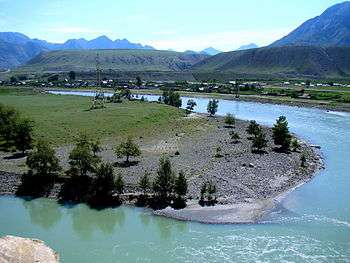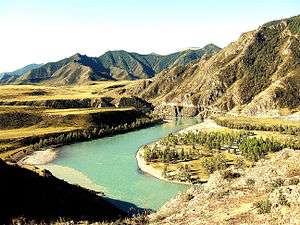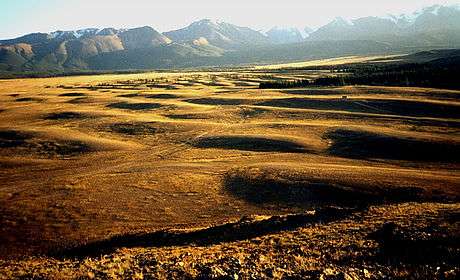Diluvium
Historically, diluvium was a term in geology for superficial deposits formed by flood-like operations of water, and so contrasted with alluvium or alluvial deposits formed by slow and steady aqueous agencies. The term was formerly given to the boulder clay deposits, which some early geologists supposed had been caused by the Noachian deluge, a concept known as flood geology or diluvialism.[1]



In the late 20th century Russian geologist Alexei Rudoy proposed the term "diluvium" for description of deposits created as a result of catastrophic outbursts of Pleistocene giant glacier-dammed lakes in intermontane basins of the Altai.[2] The largest of these lakes, Chuya and Kuray, had volumes of water in hundreds of cubic kilometers, and their discharge in peak hydrograph flow rate exceeded the maximum rates of the well-known Pleistocene Lake Missoula floods in North America. The term "diluvium" in the meaning of A. N. Rudoy has become accepted, and the process of diluvial morpholithogenesis can be found in modern textbooks.
Flood deposits of the Altai region
Nearly all intermountain depressions in southern Siberia and northern Mongolia hosted glacier-dammed lakes during the Pleistocene ice ages. Climatic changes and hydrostatic alterations of the ice dams were followed by repeated fillings and releases of the basin lakes. The lake outbursts had a cataclysmic character. In accordance with climatic conditions, the glaciers would protrude again into the main drainage valleys immediately after dam deformations and lake outbursts and would again dam the basins.
See also
- Alluvium – Loose soil or sediment that is eroded and redeposited in a non-marine setting
- Altai flood – Prehistoric event in Central Asia
- Channeled Scablands – Landscape in eastern Washington, USA scoured by cataclysmic floods during the Pleistocene epoch
- Colluvium
- Eluvium
- Giant current ripples – Depositional forms in diluvial plain and mountain scablands
- Illuvium
References
-

- Lee, Keenan, 2004, The Altai Flood
- Chuya Flood Video
- Rudoy, A.N., Glacier-dammed lakes and geological work of glacial superfloods in the Late Pleistocene, Southern Siberia, Altai Mountains, Quaternary International, 2002, Vol. 87/1, pp. 119-140.
- Baker, V. R., G. Benito, A. N. Rudoy, Paleohydrology of late Pleistocene Superflooding, Altay Mountains, Siberia, Science, 1993, Vol. 259, pp. 348–352
- Huggett Richard J., Fundamentals of Geomorphology, N.Y.: Routledge, 2007
- Rudoy A.N., Ice-dammed lakes and glacial debris super-flows in the Altay and the Sayan Mountains in late Wurm: a review
- Рудой А. Н. Giant current ripples: A Review. 12. 2010.
- Рудой А. Н. Study diluvium: general provisions. Учение о дилювии (общие положения)
- Рудой А. Н., Земцов В. А. Новые результаты моделирования гидравлических характеристик дилювиальных потоков из позднечетвертичного Чуйско-Курайского ледниково-подпрудного озера.
- Diluvium Video
- Athabasca-video in large Scale
- Alexei Rudoy. Giant gravel bars - дилювиально-аккумулятивные валы ("высокие террасы").
- А. Н. Рудой. Study diluvium: general provisions. Общие положения учения о дилювии.
- Glacial Lakes and Glacial Lake Outburst Floods in Nepal. - International Centre for Integrated Mountain Development, Kathmandu, March 2011